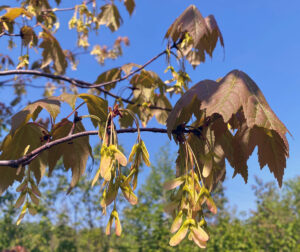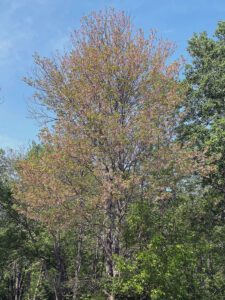
Maple trees producing large seed crops may have off-color leaves that are smaller than normal into early summer. / Photo Credit: Linda Williams, Wisconsin DNR
By Linda Williams, DNR Forest Health Specialist
Linda.Williams@wisconsin.gov or 920-360-0665
Scattered maple trees across parts of the Northwoods have produced heavy seed crops this year.
When trees produce so many seeds, it reduces the amount of energy available for producing leaves. As a result, those leaves can appear smaller and off-color into the summer. With fewer leaves produced, these trees will continue to look very thin throughout this year’s growing season.

A maple tree loaded with seed and fewer leaves than normal. / Photo Credit: Linda Williams, Wisconsin DNR
Heavy seed years can occur for many reasons. It happens naturally from time to time but can also be stimulated by environmental stressors such as drought, flooding, winter injury or frost damage to roots.
In urban areas, trees that produce heavy seed crops should be supported with extra water during dry, droughty periods. In forested areas, when trees produce large seed crops that interfere with leaf production, it may take a couple of years for the trees to recover fully from the energy expenditure and a smaller-than-normal number of leaves.
